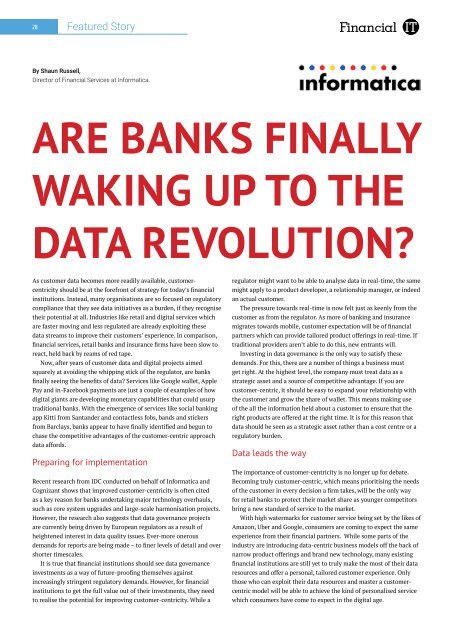Revolutionizing the Financial Markets
Cím: Forradalmasítja a pénzügyi piacok Leírást/ellenőrzések: Több mint 100 000 előfizetőt, amelyek 70 %-a bankok, a pénzügyi az összpontosított közzététele a vezető pénzügyi technológiai hírek a világ, beleértve a technológia blockchain és a cryptocurrencies.
Cím: Forradalmasítja a pénzügyi piacok
Leírást/ellenőrzések: Több mint 100 000 előfizetőt, amelyek 70 %-a bankok, a pénzügyi az összpontosított közzététele a vezető pénzügyi technológiai hírek a világ, beleértve a technológia blockchain és a cryptocurrencies.
- No tags were found...
You also want an ePaper? Increase the reach of your titles
YUMPU automatically turns print PDFs into web optimized ePapers that Google loves.
28<br />
Featured Story<br />
By Shaun Russell,<br />
Director of <strong>Financial</strong> Services at Informatica.<br />
ARE BANKS FINALLY<br />
WAKING UP TO THE<br />
DATA REVOLUTION?<br />
As customer data becomes more readily available, customercentricity<br />
should be at <strong>the</strong> forefront of strategy for today’s financial<br />
institutions. Instead, many organisations are so focused on regulatory<br />
compliance that <strong>the</strong>y see data initiatives as a burden, if <strong>the</strong>y recognise<br />
<strong>the</strong>ir potential at all. Industries like retail and digital services which<br />
are faster moving and less regulated are already exploiting <strong>the</strong>se<br />
data streams to improve <strong>the</strong>ir customers’ experience. In comparison,<br />
financial services, retail banks and insurance firms have been slow to<br />
react, held back by reams of red tape.<br />
Now, after years of customer data and digital projects aimed<br />
squarely at avoiding <strong>the</strong> whipping stick of <strong>the</strong> regulator, are banks<br />
finally seeing <strong>the</strong> benefits of data? Services like Google wallet, Apple<br />
Pay and in-Facebook payments are just a couple of examples of how<br />
digital giants are developing monetary capabilities that could usurp<br />
traditional banks. With <strong>the</strong> emergence of services like social banking<br />
app Kitti from Santander and contactless fobs, bands and stickers<br />
from Barclays, banks appear to have finally identified and begun to<br />
chase <strong>the</strong> competitive advantages of <strong>the</strong> customer-centric approach<br />
data affords.<br />
Preparing for implementation<br />
Recent research from IDC conducted on behalf of Informatica and<br />
Cognizant shows that improved customer-centricity is often cited<br />
as a key reason for banks undertaking major technology overhauls,<br />
such as core system upgrades and large-scale harmonisation projects.<br />
However, <strong>the</strong> research also suggests that data governance projects<br />
are currently being driven by European regulators as a result of<br />
heightened interest in data quality issues. Ever-more onerous<br />
demands for reports are being made – to finer levels of detail and over<br />
shorter timescales.<br />
It is true that financial institutions should see data governance<br />
investments as a way of future-proofing <strong>the</strong>mselves against<br />
increasingly stringent regulatory demands. However, for financial<br />
institutions to get <strong>the</strong> full value out of <strong>the</strong>ir investments, <strong>the</strong>y need<br />
to realise <strong>the</strong> potential for improving customer-centricity. While a<br />
regulator might want to be able to analyse data in real-time, <strong>the</strong> same<br />
might apply to a product developer, a relationship manager, or indeed<br />
an actual customer.<br />
The pressure towards real-time is now felt just as keenly from <strong>the</strong><br />
customer as from <strong>the</strong> regulator. As more of banking and insurance<br />
migrates towards mobile, customer expectation will be of financial<br />
partners which can provide tailored product offerings in real-time. If<br />
traditional providers aren’t able to do this, new entrants will.<br />
Investing in data governance is <strong>the</strong> only way to satisfy <strong>the</strong>se<br />
demands. For this, <strong>the</strong>re are a number of things a business must<br />
get right. At <strong>the</strong> highest level, <strong>the</strong> company must treat data as a<br />
strategic asset and a source of competitive advantage. If you are<br />
customer-centric, it should be easy to expand your relationship with<br />
<strong>the</strong> customer and grow <strong>the</strong> share of wallet. This means making use<br />
of <strong>the</strong> all <strong>the</strong> information held about a customer to ensure that <strong>the</strong><br />
right products are offered at <strong>the</strong> right time. It is for this reason that<br />
data should be seen as a strategic asset ra<strong>the</strong>r than a cost centre or a<br />
regulatory burden.<br />
Data leads <strong>the</strong> way<br />
The importance of customer-centricity is no longer up for debate.<br />
Becoming truly customer-centric, which means prioritising <strong>the</strong> needs<br />
of <strong>the</strong> customer in every decision a firm takes, will be <strong>the</strong> only way<br />
for retail banks to protect <strong>the</strong>ir market share as younger competitors<br />
bring a new standard of service to <strong>the</strong> market.<br />
With high watermarks for customer service being set by <strong>the</strong> likes of<br />
Amazon, Uber and Google, consumers are coming to expect <strong>the</strong> same<br />
experience from <strong>the</strong>ir financial partners. While some parts of <strong>the</strong><br />
industry are introducing data-centric business models off <strong>the</strong> back of<br />
narrow product offerings and brand new technology, many existing<br />
financial institutions are still yet to truly make <strong>the</strong> most of <strong>the</strong>ir data<br />
resources and offer a personal, tailored customer experience. Only<br />
those who can exploit <strong>the</strong>ir data resources and master a customercentric<br />
model will be able to achieve <strong>the</strong> kind of personalised service<br />
which consumers have come to expect in <strong>the</strong> digital age.



